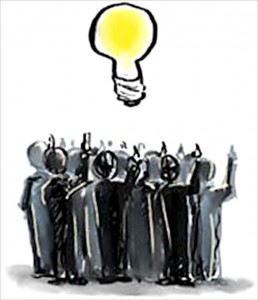
In Robert Berenson, MD and Nicole Cafarella’s article, Is the CMS Innovation Center Innovating Too Fast?, the authors note that, “One of the few
In Robert Berenson, MD and Nicole Cafarella’s article, Is the CMS Innovation Center Innovating Too Fast?, the authors note that, “One of the few health policy issues that receives bipartisan support is the need to dramatically alter the way providers are paid, shifting from “paying for volume” to “paying for value” to alter the trajectory of health care spending while improving health care quality.” One of the cost-cutting and quality enhancing tools created to facilitate this activity is the Center for Medicare and Medicaid Innovation. While previously focused primarily on policy matters, the Innovation Center has added a new tactic to its strategy: crowdsourcing. Originally coined by Jeff Howe, crowdsourcing’s open call technique helps solve complex problems by leveraging individuals most fit to perform identified tasks, thereby encouraging development of the most relevant and fresh ideas.
The CMS Innovation Center is deploying this tactic by issuing a number of innovation challenges with the intent to award up to $1 billion in grants to applicants who will implement the most compelling new ideas to deliver better health, improved care and lower costs to people enrolled in Medicare, Medicaid and CHIP, particularly those with the highest health care needs. As further stipulated in Berenson and Cafarella’s artice, “Despite relatively broad agreement in the policy community on the Innovation Center’s objectives, some are skeptical about the role of government, as centralized in the Innovation Center, in promoting and adopting true innovation. Another criticism is that the speed and approach it is using―rolling out over a dozen initiatives in rapid succession―are leaving behind potential innovators that have not been ready to respond to the quick pace of new funding opportunities.”
While proponents will likely fall on both sides of the coin, it is interesting to note that: a) bipartisan support underscores the fact that the majority grasp the need to develop better care delivery systems and processes and b) the crowdsourcing technique has generated mass response and appeal. Inherent to the crowdsourcing definition, physicians, nurses, allied health and support professionals are conceivably the most fit to address healthcare delivery issues. And if it is working at the federal and state level, why aren’t healthcare organizations adopting this model at their own institutions? Penn Medicine is.
Launched on February 7th, “Your Big Idea: Penn Medicine Innovation Tournament” offers faculty and staff the opportunity to submit patient experience innovations for evaluation and potential funding. A well defined process will help define the top 10 submissions, followed by contestants pitching their ideas to Penn Medicine’s leadership in a town hall setting. The winning ideas will receive funding and resources for implementation. While politics and budget concerns will likely determine the fate of federal care delivery improvements, perhaps crowdsourcing can prove to be the stimulant for healthcare innovation at the grass roots level.
Principle Healthcare Associates is an expert resource and dedicated advocate for Nurse Practitioner, Physician Assistant, Physician and Healthcare Executive job seekers. With many years of recruiting experience, we deliver strategies to help clients identify diamonds in the rough and candidates stand head and shoulders above the competition.
